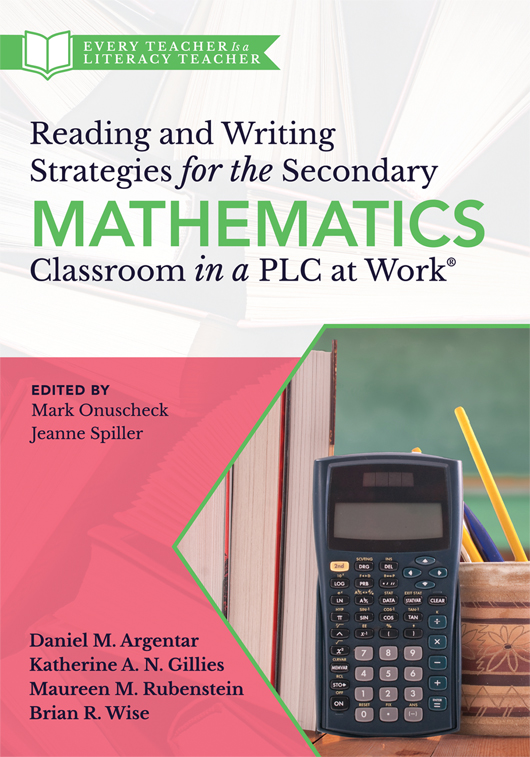Free Reproducibles
Reading and Writing Strategies for the Secondary Mathematics Classroom in a PLC at Work®
Students need literacy support to think, read, and write in every subject, including math. Part of the Every Teacher Is a Literacy Teacher series; this book emphasizes the importance that the PLC at Work® process has in supporting learners who struggle with literacy. Grades 6–12 teachers will strengthen reading capabilities with practical reading and writing strategies specifically designed for mathematics instruction.
Benefits
- Learn how to incorporate writing instruction into mathematics curriculum and why it’s important.
- Collaborate with colleagues using end-of-chapter prompts that encourage PLC cooperation.
- Implement immediate intervention strategies for struggling students to shorten learning gaps.
- Strategize mathematics instruction to effectively address both struggling students and those at proficient levels.
- Implement formative and summative assessments and look at feedback.
TABLE OF CONTENTS
Introduction: Every Teacher Is a Literacy Teacher
Chapter 1: Collaboration, Learning, and Results
Chapter 2: Foundational Literacy Triage
Chapter 3: Thinking Like a Mathematician
Chapter 4: Prereading Strategies
Chapter 5: During–Reading and Postreading Strategies
Chapter 6: Strategies for Writing About Mathematics
Chapter 7: Assessment
Appendix: Reproducibles
PRINTABLE REPRODUCIBLES
Introduction: Every Teacher Is a Literacy Teacher
Chapter 1: Collaboration, Learning, and Results
- Figure 1.1: Content–standard analysis tool
- Figure 1.2: Review tool to discern whether text tasks match complex disciplinary literacy demands
Chapter 2: Foundational Literacy Triage
Chapter 3: Thinking Like a Mathematician
- Figure 3.2: Sample completed Mathematics Process Log
- Figure 3.3: Text–dependent questioning strategy and graphic organizer
Chapter 4: Prereading Strategies
- Figure 4.2: Example of the Frayer model graphic organizer for mathematics prereading
- Figure 4.4: Sample predicting and confirming activity
Chapter 7: Assessment
Appendix: Reproducibles
- Reading Comprehension Process
- Content–Standard Analysis Tool
- Review Tool to Discern Whether Text Tasks Match Complex Disciplinary Literacy Demands
- Fix–Up Strategies Bookmark
- Mathematics Process Log
- Text–Dependent Questioning Strategy and Graphic Organizer
- Frayer Model Graphic Organizer
- Predicting and Confirming Activity
- Data–Analysis Perspectives
SUGGESTED RESOURCES
Books
- Bailey, K., & Jakicic, C. (2012). Common formative assessment: A toolkit for Professional Learning Communities at Work. Bloomington, IN: Solution Tree Press.
- Buffum, A., Mattos, M., & Malone, J. (2018). Taking action: A handbook for RTI at Work™. Bloomington, IN: Solution Tree Press.
- Buffum, A., Mattos, M., & Weber, C. (2012). Simplifying response to intervention: Four essential guiding principles. Bloomington, IN: Solution Tree Press.
- Conzemius, A. E., & O’Neill, J. (2014). The handbook for SMART school teams: Revitalizing best practices for collaboration (2nd ed.). Bloomington, IN: Solution Tree Press.
- DuFour, R., DuFour, R., Eaker, R., Many, T. W., Mattos, M., & Muhammad, A. (2024). Learning by doing: A handbook for Professional Learning Communities at Work (4th ed.). Bloomington, IN: Solution Tree Press.
- Ferriter, W. M. (2020). The big book of tools for collaborative teams in a PLC at Work®. Bloomington, IN: Solution Tree Press.
- Kise, J. A. G. (2021). Doable differentiation: 12 strategies to meet the needs of all learners. Bloomington, IN: Solution Tree Press.
- Townsley, M., & Wear, N. L. (2020). Making grades matter: Standards-based grading in a Secondary PLC at Work. Bloomington, IN: Solution Tree Press.
Websites
Introduction
Chapter 1
Chapter 2
Chapter 3
Chapter 6
Chapter 7

